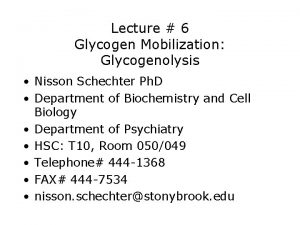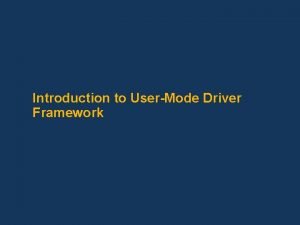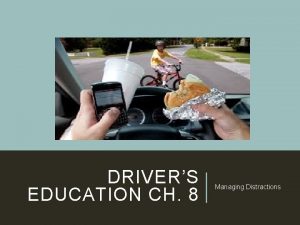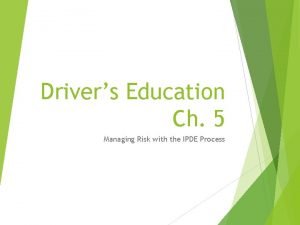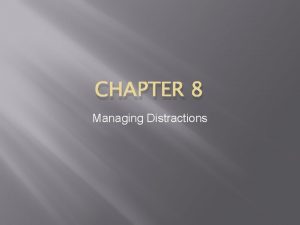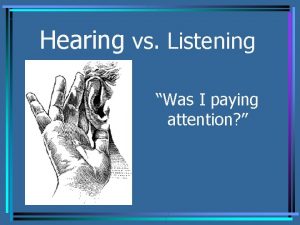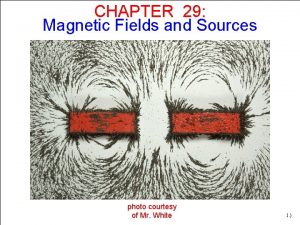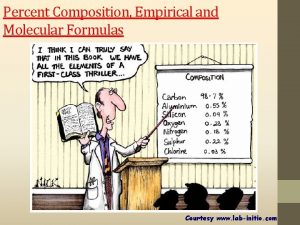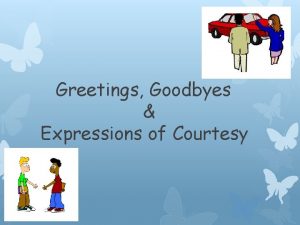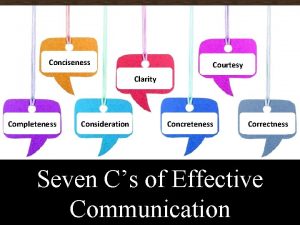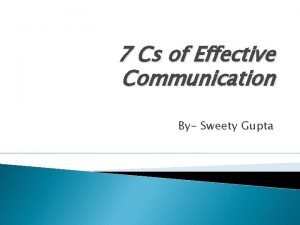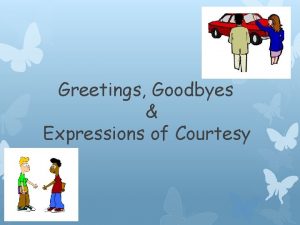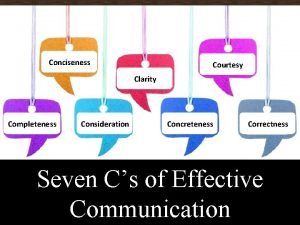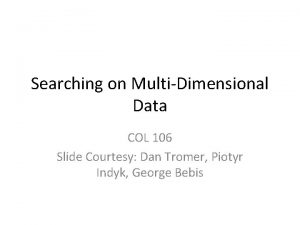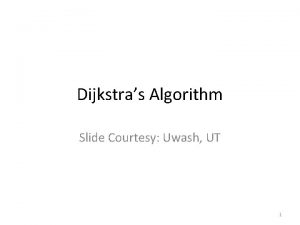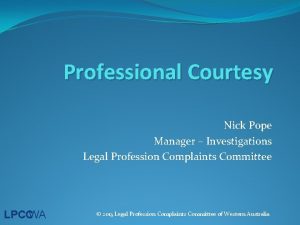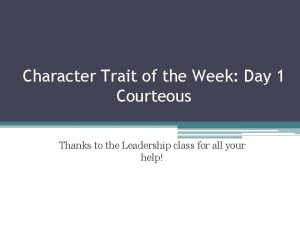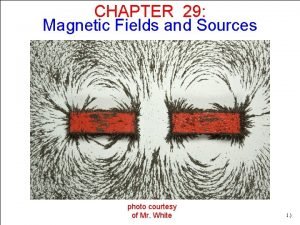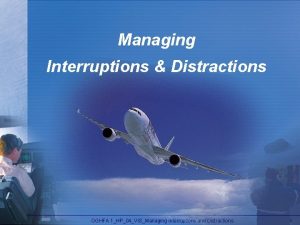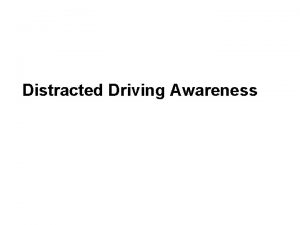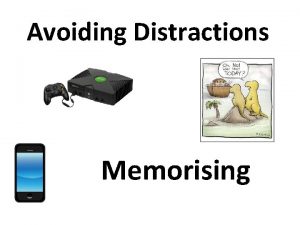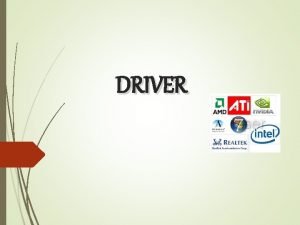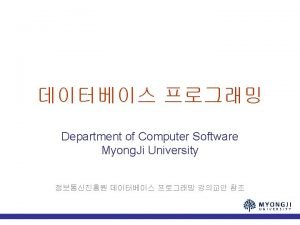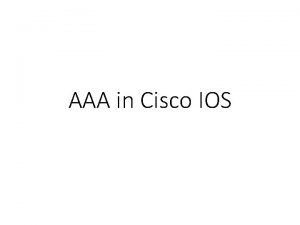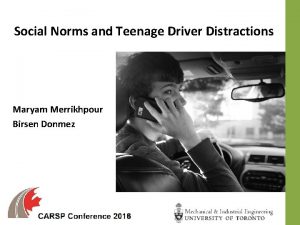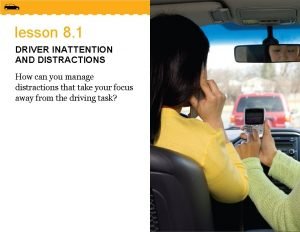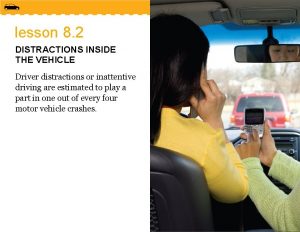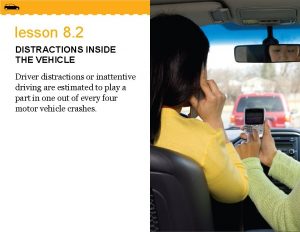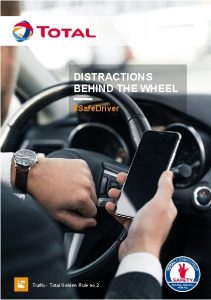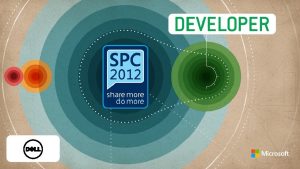Reducing Driver Distractions Photo courtesy of the AAA



































- Slides: 35

Reducing Driver Distractions Photo courtesy of the AAA Foundation http: //www. mpi. mb. ca/en/Videos/Driver. Distractions. wmv

DRIVER DISTRACTIONS • Each year, more than 40, 000 people are killed in motor vehicle crashes and over three million are injured! • Research indicates that driver distraction is a contributing factor in more than 25% of all crashes Source: AAA Foundation Research

DRIVER DISTRACTIONS- OUTSIDE THE VEHICLE Photo courtesy of the AAA Foundation • Bright vehicle lights • Billboards and signs • Driver being chased by police • Officer directing traffic • Animal in roadway (deer, dog, elk, etc. )

DRIVER DISTRACTIONSOUTSIDE THE VEHICLE • Sunrise, sunset • People in roadway (child, basketball game, crowd, etc) • Objects in the roadway (broken glass, garbage can, etc. holes) • Crash scene Photo courtesy of the AAA Foundation

DRIVER DISTRACTIONSINSIDE THE VEHICLE • Eating or drinking • Other occupants in the vehicle • Moving object in vehicle • All actions involved with smoking can be a distraction Photo courtesy of the AAA Foundation

DRIVER DISTRACTIONSINSIDE THE VEHICLE • Dialing, talking, texting or looking up information on a cell phone • Adjusting radio, cassette, or CD • Using device/object in the vehicle • Using vehicle devices or controls • Picking up a dropped object Photo courtesy of the AAA Foundation

PROBLEMS WITH DRIVER DISTRACTIONS ARE NOT NEW • Some of the “old” distractions that continue to cause problems are children and babies, cigarettes, drinks, radios and audio players, and insects or bugs that find their way into the vehicle. Photo courtesy of the AAA Foundation

PROBLEMS WITH DRIVER DISTRACTIONS ARE NOT NEW • Newer” distractions include GPS navigation systems, digital music, On-Star roadside assistance, and cell phones. Photo courtesy of the AAA Foundation

NEW ISSUE OR OLD ISSUE? 1913 1930 Windshield Radios Wipers 1954 1983 2000 2010 Drive-Up Windows Mobile Phones MP 3 and DVD players Email, Internet, texting, etc. • Driver Distractions from 1913 -2010

DRIVER AGE GROUPS DISTRACTIONS • Drivers under age 20 are more likely than older drivers to be identified as distracted at the time of their crash. • 20 -29 year-olds use a cell phone frequently. • 30 -49 year-olds eat and drink more often in the car. • 50 plus drivers are more distracted by outside objects and events. Photos courtesy of the AAA Foundation

WHEN DISTRACTIONS LEAD TO COLLISIONS • Distractions and inattention cause 68% of rear-end crashes. • Other typical crashes include backing up, making lane changes, and merging. Photo courtesy of the AAA Foundation

HIGH RISK DRIVING DISTRACTIONS • Reading and writing. • Manipulating vehicle controls for extended periods of time. • Focusing on an external distraction. • Having emotionally charged discussion with passengers. • Reaching for objects inside the vehicle. • Dialing a cell phone. • Carrying on a cell phone conversation. • Performing grooming activities when the vehicle is moving. • Texting · http: //www. youtube. com/watch? v=R 0 LCm. St. Iw 9 E

WHEN DISTRACTIONS LEAD TO COLLISIONS High-risk drivers tend to have higher levels of no hands on the steering wheel, their eyes are directed inside rather than outside the vehicle, and their vehicles wander in the travel lane or cross into another travel lane. Photo courtesy of the AAA Foundation

DISTRACTIONS ARE AFFECTING DRIVER LAWS Many states are passing, or looking into passing, laws regarding driver distractions.

DISTRACTIONS ARE AFFECTING DRIVER LAWS Much of this attention stems from the enormous increase in cell phone use by drivers and the prospect of similar growth in other in-vehicle technologies. Photo courtesy of the AAA Foundation

TECHNOLOGY ─ HELPFUL OR HARMFUL? • Drivers must use new technology responsibly while driving. • Electronic devices can enhance safety in many ways. • When stuck in traffic, using a mobile phone to say you'll be late can reduce stress and make drivers less inclined to drive aggressively. • Any activity that takes your attention from the road makes the driving task more dangerous! Photo courtesy of the AAA Foundation

NEW VEHICLE TECHNOLOGY- HELPFUL OR HARMFUL? • Vehicle navigation systems help drivers locate addresses and guide them to their destination. • Wireless Internet and messaging are becoming the norm on my phones and in many new vehicles. • In-vehicle DVD movie players are popular for passengers to pass time when going on a lengthy trip. • Are movies a distraction for drivers? Photo courtesy of the AAA Foundation

CONSEQUENCES OF DISTRACTED DRIVING • Distracted driving is one of the leading causes of collisions. • It forces drivers to make sudden decisions. • Drivers can easily be involved in a collision. Photo courtesy of the AAA Foundation

CONSEQUENCES OF DISTRACTED DRIVING • Each year, more than 40, 000 people are killed in motor vehicle crashes and over three million are injured. • Distracted driving contributes to over 1, 500, 000 collisions each year. • That’s 4, 300 collisions each day • 179 Collisions every hour.

DIVIDED ATTENTION TASKS Divided attention can lead to missed brake lights, missed traffic sign or signal, missed animal or pedestrian, or a drift out of the lane position. Photo courtesy of the AAA Foundation

DIVIDED ATTENTION TASKS • A driver can learn to operate the vehicle with simple eye, hand, and feet coordination. • However, the driving task is a mental process that needs constant attention to the path of travel in order to keep the vehicle within the lane space and adjust to any restrictions in the path of travel. Photo courtesy of the AAA Foundation

DIVIDED ATTENTION TASKS • It is important to recognize that taking attention from the path of travel means the vehicle is moving on the roadway without the driver seeing where the vehicle is going or mentally processing any new information.

DIVIDED ATTENTION TASKS • It is critical never to look away from the path of travel for more than ½ second at a time without moving visual and mental attention back to the path of travel. Photo courtesy of the AAA Foundation

LEARNING HOW TO HANDLE DISTRACTIONS • Learning to drive involves learning how to develop divided attention to different tasks. • Know how to operate the vehicle controls. • Be able to keep the vehicle on the road. • Be able to keep the vehicle in the lane. • Be able to place the vehicle in different lane positions. • Be able to avoid risk. Photo courtesy of the AAA Foundation

CELL PHONE STRATEGIES • A "hands-free" apparatus may be helpful, but they can't prevent drivers from becoming involved in a conversation and losing concentration. • If you must use a cell phone, especially to text, safely pull over to the side of the road. • If drivers must respond to an emergency while driving, use speed dial features and a hands-free kit. • Alert the caller that you are on the road. • Keep calls as brief as possible.

IDAHO’S TEXTING AND DRIVING LAW • As of July 1, 2012, no driver in the state of Idaho can text while driving.

BUT WHAT IS “TEXTING? ” • The definition of texting is: “reviewing, manually preparing, or transmitting written communication by a handheld wireless device. ” http: //www. youtube. com/watch? v=R 0 LCm. St. Iw 9 E

WHAT ABOUT…. ? • Calling someone? – Dialing a number or answering a call is fine. – Scrolling through an address book is not. • Hands-free or voice activated? – Both are fine! • Using a GPS device or GPS app? – No, it is “reviewing written communication. ” – Do all mapping and trip planning before driving or when stopped.

OR…? • Just reading a text message? – Definitely not legal or safe. No. • Facebook posts or messages? – No. They are as dangerous as text messages. • Looking up the time a movie starts? – No. That is reviewing written communication. • Activating or deactivating a phone feature or function? – Yes. This is legal.

So a cell phone can pretty much only be used as a phone while driving? YES!

EVEN BETTER…

CHILDREN AND DRIVING • Make sure children are comfortable and properly buckled up. • To keep children from distracting the driver, provide them with safe items they may need for the road trip.

FOOD AND DRIVING • Give yourself a break from the traffic and enjoy your refreshments outside the car. • Someone choking on food or spilling liquid in the vehicle can take the driver’s attention off the road. Photo courtesy of the AAA Foundation

OTHER STRATEGIES FOR REDUCING RISK • Avoid reading while driving. • Finish grooming before driving. • Don't rely on the time in your vehicle to take care of personal routine such as applying make-up, combing hair or shaving. Photo courtesy of the AAA Foundation

(AAA Video on DVD)
 R and t state
R and t state Maltosazone shape
Maltosazone shape Reducing vs non reducing sugars
Reducing vs non reducing sugars What is reducing sugar
What is reducing sugar User mode driver framework
User mode driver framework To hear with attention
To hear with attention Biomechanical drivers ed
Biomechanical drivers ed Zone control system in driving
Zone control system in driving Chapter 8 managing distractions answers
Chapter 8 managing distractions answers Factual distractions
Factual distractions Courtesy formulas
Courtesy formulas Attitude and respect
Attitude and respect Courtesy
Courtesy How to calculate empirical formula with percentages
How to calculate empirical formula with percentages Greetings and farewells in english and spanish
Greetings and farewells in english and spanish Sender courtesy adalah
Sender courtesy adalah Slide courtesy of
Slide courtesy of Courtesy formulas
Courtesy formulas Correctness in effective communication
Correctness in effective communication Umlsec
Umlsec Courtesy hor
Courtesy hor Greetings farewells and courtesy expressions en español
Greetings farewells and courtesy expressions en español Concreteness and conciseness
Concreteness and conciseness Courtesy
Courtesy Courtesy
Courtesy Service sequence in serving food and beverage
Service sequence in serving food and beverage Slide courtesy
Slide courtesy Courtesy notice
Courtesy notice Slide courtesy
Slide courtesy Professional courtesy examples
Professional courtesy examples Speech of courtesy examples
Speech of courtesy examples Courtesy traits
Courtesy traits Courtesy
Courtesy Military courtesy definition
Military courtesy definition Coe 202
Coe 202 Courtesy award
Courtesy award
